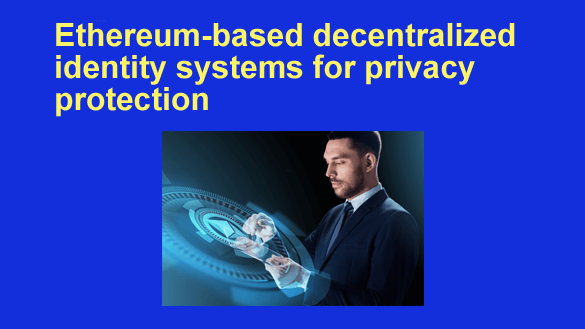 In a world where online privacy is constantly threatened, protecting personal data has never been more critical. With big tech companies collecting, storing, and sometimes selling user data, people are becoming increasingly concerned about how their information is used.
In a world where online privacy is constantly threatened, protecting personal data has never been more critical. With big tech companies collecting, storing, and sometimes selling user data, people are becoming increasingly concerned about how their information is used.
Enter Ethereum, a blockchain platform that protects user privacy through decentralized identity systems. This system allows individuals to control their personal data, keeping it safe from centralized platforms.
Whether you’re a tech enthusiast or just someone concerned about your online privacy, this could be a game-changer. In fact, the growing interest in this technology may boost the Ethereum price.
Let’s dive into how Ethereum can help create self-sovereign identity systems and protect your data in this new era of privacy.
What is a Decentralized Identity System?
Before getting into the Ethereum part, we must understand decentralized identity (or DID) systems. A decentralized identity system allows individuals to control their identities without needing a central authority, like a government or tech company, to verify or store their information.
In simpler terms, you control your personal information, like your name, age, and digital identity, and decide who will see it. Think of it as owning a digital passport that only you can control. No one can take it from you or use it without your permission. And that’s precisely where Ethereum comes into play.
How Ethereum Supports Decentralized Identity
Ethereum is more than just a cryptocurrency platform. It’s a decentralized, open-source blockchain that allows developers to create smart contracts and decentralized applications (dApps).
This means Ethereum can facilitate decentralized identity systems by providing a secure, immutable, and transparent platform for managing personal data.
Here’s how it works:
- Smart Contracts: On Ethereum, self-executing contracts (smart contracts) can handle identity verification without needing a third party. For instance, if you’re trying to verify your age to access a service, a smart contract can verify this without revealing other personal details like your name or address.
- Immutable Data Storage: Ethereum’s blockchain ensures that no one can alter or delete it once data is added. It adds a layer of security since your data can’t be tampered with or changed by any unauthorized parties.
- Transparency and Control: With Ethereum, users can decide who gets access to their information and for how long. You can share your identity or data for a specific transaction, and once you do it, you can revoke that access.
Why Self-Sovereign Identity Matters
Self-sovereign identity (SSI) is a concept in which individuals have full control over their personal information. Right now, our digital identities are stored on centralized platforms.
Whenever you create an account with a company, you hand over your personal information. While most companies promise to protect it, data breaches, leaks, and unauthorized information sales are not uncommon.
With Ethereum-based decentralized identity systems, the power shifts back to you. SSI allows you to:
- Control Access: You can decide who sees your information and under what circumstances. No more blanket consent to companies that use your data however they want.
- Reduce Risks of Data Breaches: Since you haven’t stored your data in a central database, it is less vulnerable to being hacked or stolen.
- Eliminate Middlemen: No need to rely on centralized authorities or third-party services to manage or verify your identity. You are your authority.
Ethereum-Based Identity Systems in Action
Several projects are already working on using Ethereum to create decentralized identity systems.
Let’s look at a few real-world examples:
- uPort: uPort is an Ethereum-based decentralized identity platform allowing users to manage their digital identity. It will enable individuals to register their identity, log into apps, and digitally sign documents without relying on third parties. You don’t need Google or Facebook to verify your identity when logging into websites.
- Sovrin: While Sovrin is not purely Ethereum-based, it does make use of decentralized technology to offer self-sovereign identity solutions. Using blockchain, Sovrin allows people to create, store, and share their verifiable credentials, such as diplomas or licenses, without relying on a central authority.
- Civic: Civic is another Ethereum-based identity verification platform that allows users to protect their identity with blockchain technology. Civic enables users to share only necessary details and control their information fully.
Benefits of Using Ethereum for Decentralized Identity
There are several advantages to using Ethereum as the foundation for decentralized identity systems:
- Security: Ethereum’s decentralized nature means there’s no single point of failure. This makes it harder for hackers to breach data, as there’s no central database to target.
- Transparency: The public ledger of Ethereum allows for full transparency. However, since Ethereum transactions can also be anonymous, you get visibility and privacy.
- Reduced Costs: Centralized platforms often charge fees for identity verification or management. With Ethereum’s peer-to-peer system, you can significantly reduce these costs.
- Global Access: As a decentralized platform, Ethereum can provide identity verification for people in regions with less reliable government systems or underdeveloped tech infrastructure.
Conclusion
The rise of decentralized identity systems shows that people are ready for a shift away from centralized control over personal data. Ethereum’s technology provides the perfect foundation for self-sovereign identity, allowing individuals to regain control over their privacy.
As more people become aware of the benefits of decentralized systems, the demand for platforms like Ethereum is expected to grow. The push for better privacy solutions could also contribute to a positive change in Ethereum price, as more people see the potential for blockchain technology to solve real-world problems.